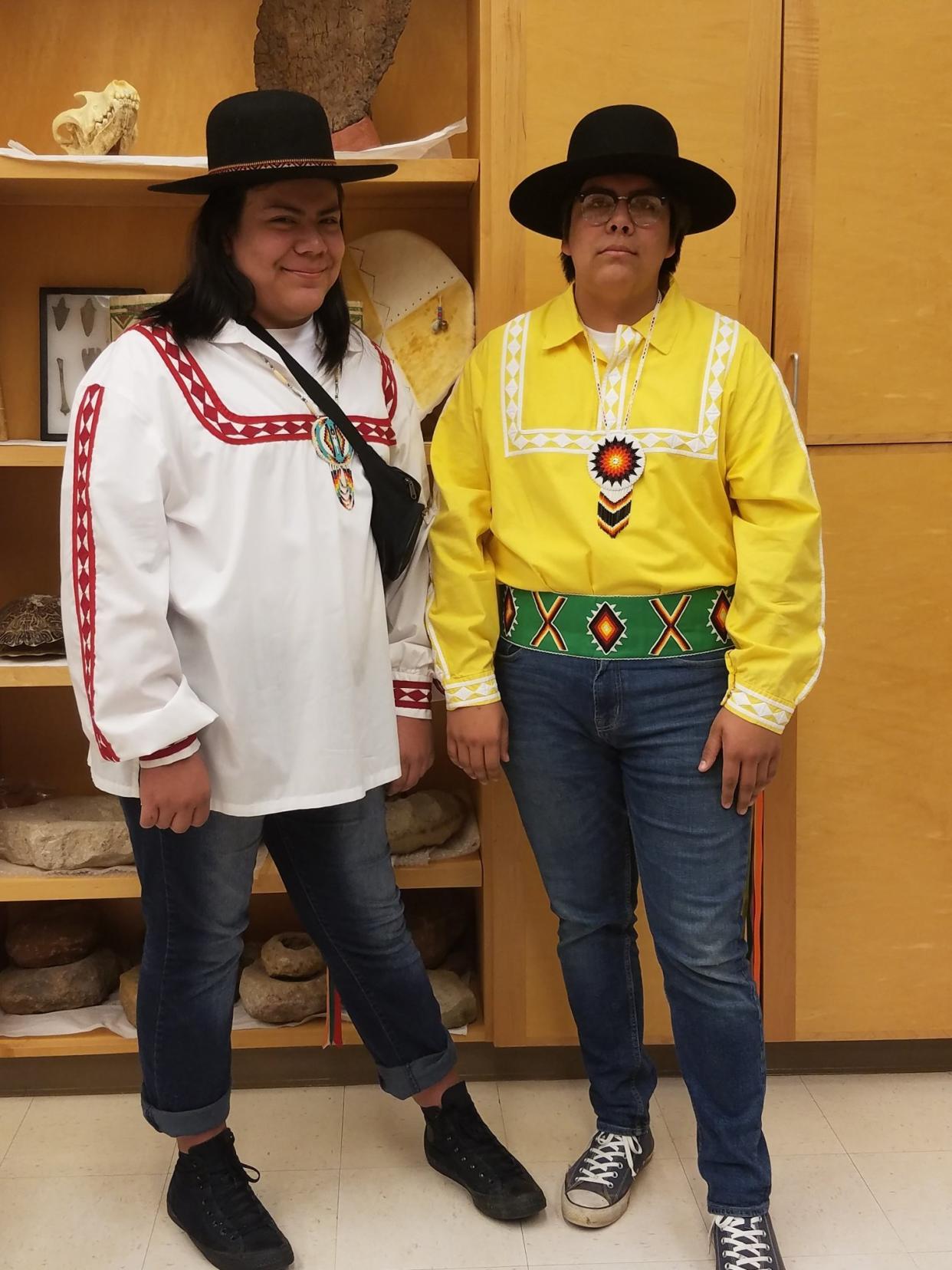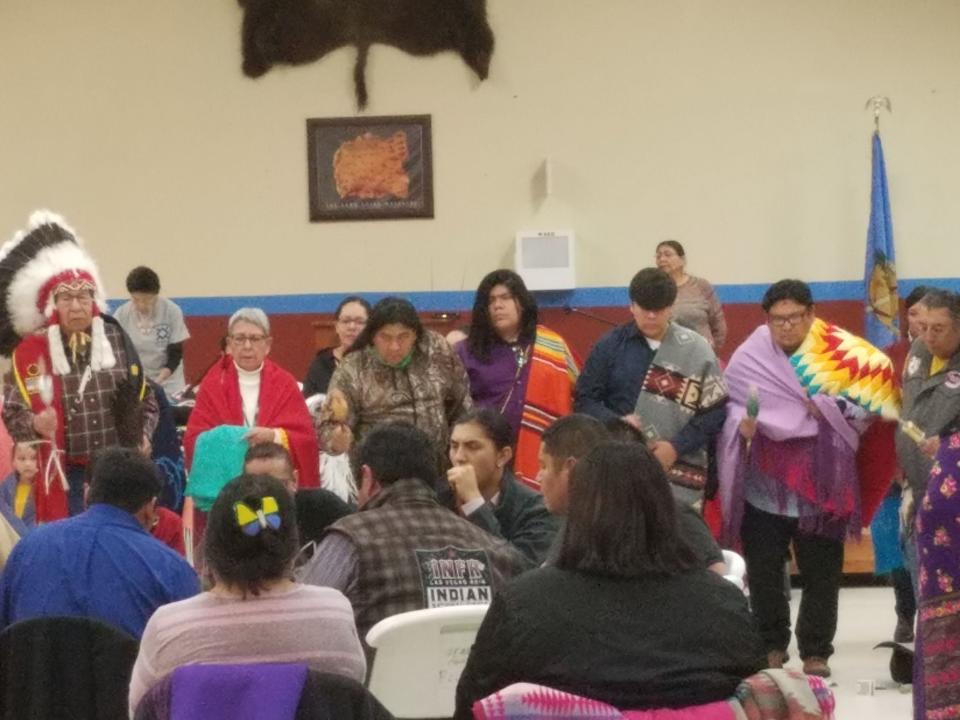School district denies high school student from wearing Native American emblems to graduation: 'These items are who he is'

Oklahoma high school senior Tvli Birdshead was looking forward to finally receiving his high school diploma, while proudly wearing his tribe’s honor cord, a beaded cap and a feather— tributes to his Native American roots and academic achievements. But instead of preparing for this important milestone, the honor student is facing an uphill battle.
Latta High School officials have told the Birdshead family that Tvli would not be allowed to wear the Native American regalia at his graduation ceremony, citing the school district dress code policy. Weeks before his graduation in May, Birdshead and his mother Taloa are fighting for Tvli’s right to wear the emblems honoring his Native American heritage.
“Wearing these things is acknowledging that I’m the future leader and that this is the first step towards a higher education,” Tvli Birdshead told KFOR. “It means a whole different thing.”
Birdshead is proud of his rich Native American background; the eighteen-year-old is a member of five Civilized Tribes and Plains tribes. Tvli’s eagle feather and beaded cap are significant ceremonial staples for Native Americans graduates across the country.
“When a family member is asked or offers to bead that cap it is a high honor, and that beadwork takes time and a lot of thought about the person they are beading for. The colors and design are carefully chosen. The Eagle feather is very spiritual,” Taloa, 41, tells Yahoo Lifestyle, adding that Tvli’s cousin hand-beaded his cap. “It is given by the tribe to honor the graduate for their academic achievement. It is to be worn to show who they are, what Native Nations they represent.”

High school graduations are an especially important milestone for Native Americans, who have the lowest high school graduation rate of any racial and ethnic demographic. Tvli has defied these statistics, graduating as an honor student, ranking in the top ten of his class, while remaining extremely active in student council and Native youth organizations.
The honor cord was given to Tvli and other Native students by the Chickasaw Nation to to celebrate their tribe’s heritage and accomplishments during this rite of passage.
“Pride in the educational achievement of our young people has been a part of Chickasaw culture for generations,” the Chickasaw Nation Governor Bill Anoatubby tells Yahoo Lifestyle. “We hope these cords serve as a symbol of that pride and a source of encouragement for years to come, and we hope that all institutions recognize our intent.”
But for Taloa, her son’s right to wear the Native American regalia means much more— she believes it is a reconciliation of America’s painful past with the Native American people.
“He should be allowed to wear his Eagle feather, his beaded cap, and his honor cord from Chickasaw Nation and any other Nation he represents to not only honor him, but to show respect for the people who have supported his efforts and paved his way,” Taloa tells Yahoo Lifestyle. “These ‘items’ in the past were things that were stripped from his ancestors in an attempt to assimilate Native people. These ‘items’ are an interweaving of his spirituality and his culture. These ‘items’ are who he is.”
For this reason, Tvli and his mother Taloa refuse to stand down to the school’s restrictive policy. Taloa has had several meetings with school officials to appeal the dress code to no avail. Taloa was baffled by their response considering Latta Public School’s nearly 37 percent Native student population, adding that it readily accepts Title VI federal grants and donations from the Chickasaw Nation. “I explained to the superintendent that by allowing them to wear their sacred regalia the school would be meeting those unique needs of this same Native population to take back pride in themselves and the people they represent,” says Taloa.

Superintendent Cliff Johnson explains that their requests were denied because “the student handbook only allows school issued items to be worn at graduation ceremonies,” he writes to Yahoo Lifestyle in an email.
With school officials refusing to accede, the Birdshead family is taking up the issue at a Latta Public School board meeting. She has enlisted the help of the American Civil Rights Liberty Union (ACLU) and the Native American Rights Fund (NARF) who have sent letters of demand to the school and will represent the Birdsheads at the meeting. Taloa hopes that the school board will reverse the policy and allow Tvli to walk across the graduation stage with his Chickasaw nation cord, beaded cap and feather. If not, the ACLU told Taloa “they were ready and willing to pursue litigation.”
Reports of Latta High School officials’ decision to bar Native American students from wearing their honor cords and other Native American emblems have sparked outrage across the Latta communtiy, with many condemning the “blatant discrimination.”
“The fact that you guys won’t allow a Native student to wear his regalia, feather and cord is absolutely disgusting. How disappointing for this place to participate in such blatant discrimination,” wrote one Facebook user on the Latta High School Facebook page. “We’re not taking no for an answer. Our people already went through assimilation schools, were not gonna let you take our honor away from us! Super proud of my Native brothers and sisters for making it this far!!!”
Other community members believe that the decision violates Tvli’s right to religious freedom, pointing out the “double standard” that the school likely allows Christian students to wear crosses at the ceremony “This school hides behind a trivial school policy to discriminate against Natives. They are denying a student's right to wear deeply symbolic regalia for graduation. It is abhorrent and mocking of the American concept of religious freedom,” writes another Facebook user. “I am willing to wager they do not ban students from wearing crosses, so this is undoubtedly a double standard.”
Superintendent Johnson says that Latta High School officials have made arrangements to allow Tvli and Taloa to address the school board on May 6th. The school has also organized a public hearing to address the concerns around the dress code policy, inviting “all Indian students, parents of Indian students, tribal officials, and members of the Latta Community” to attend.
Taloa says she is proud of Tvli and believes he was chosen to accept this challenge “because of his interweaved lineage of tribes” that will allow him “to reach many tribes as a result of his background and upbringing.”
“Tvli and I hope to see positive change in regards to respecting and honoring the Indigenous population across the United States. It's beyond time for change,” Taloa tells Yahoo Lifestyle. “What an amazing time we live in that my son and I, and many others who have fought the same battle, would be able to see Native Nations take back the pride, strength, and honor that we were stripped of in the past.”
Read more from Yahoo Lifestyle:
Man arrested for allegedly molesting 13-year-old girl on a cruise ship
Woman tased by ‘abusive’ security guard at Oregon nightclub is suing for $250,000
Woman arrested for DUI after driving with margarita in cup holder
Follow us on Instagram, Facebook and Twitter for nonstop inspiration delivered fresh to your feed, every day.

